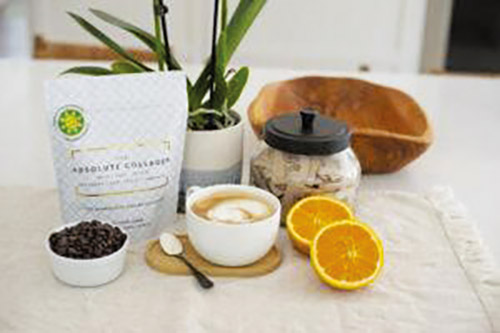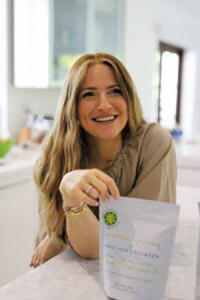
This article originally appeared on www.oukosher.org.
My Great Grandfather’s Influence

I didn’t know my great-grandfather, but I knew his face well. The iconic black and white picture of him, resting his head between his fingers—portraying him in deep thought—with his large European style rabbinic kippah, adorned the home of my grandparents, as well as the homes of my extended family. Throughout my childhood, his name and his thoughts weaved throughout Shabbos table discussions and family celebrations.
My great grandfather was Rav Elazar Mayer Preil, zt”l (1881-1933). He was born in Birzh, Lithuania, and studied in Telz and Slobodka until 1907, when he was sent to London to become the rabbi of Manchester. In 1911, he came to America and was appointed rabbi in Trenton, New Jersey. He also served as rosh yeshiva at the Rabbi Isaac Elchanan Theological Seminary and taught there until 1922. In 1919, he was appointed the rabbi of Elizabeth, New Jersey, where he served until his death in 1933. He was considered to be a gaon of Torah knowledge and was known for his righteousness. He was active in the Agudas HaRabbonim of America and was instrumental in helping to establish Ezras Torah. In addition to his many other accomplishments and writings, he authored “Sefer Hamaor,” a two volume work on halacha and aggadah.
It was also customary that at any family simcha, someone would share a “vort” from Sefer HaMaor—thereby, bringing my great-grandfather to share in the simcha through his words.
As a child, my great-grandfather impacted the minhagim we practiced. Most famously, our family uses bananas for karpas on Pesach. Anyone who has ever been to a Preil, Raymon or Teitz seder, knows that this practice came about as a way to educate the community on brachos, since the bracha on bananas is ha’adama (Don’t knock it till you try it, trust me!). When I married my husband (Rabbi Donald Bixon), we conscientiously took on this minhag to continue the influence of my great-grandfather on our family.
A few years into my marriage—with two young children—I moved away from my family in New Jersey to Miami Beach, Florida, where my husband became the inaugural rabbi of the Young Israel of Miami Beach. Thirteen years later, Young Israel of Miami Beach merged with Beth Israel Congregation. I accepted the traditional role of rebbetzin with pride, as my grandmother—Rebbetzin Hannah Raymon, a”h (the second daughter of Rabbi Preil)—had taught me. I taught in the local yeshiva high school and partnered with my husband to grow our synagogue and community
Going Into Business: Fitness Pilates on the Beach
In addition to spiritual growth, I had a personal interest in learning about health and wellness. This was inspired by my mother’s mother—my Omi—Mrs. Judit Gottdiener, a”h. I read articles, listened to podcasts and immersed myself in topics ranging from physical fitness to nutrition. In 2008, stepping out of the traditional path of a Rebbetzin, I opened a pilates studio (with my business partner, Shana Kruger), “Pilates on the Beach.” I had learned about the benefits of pilates while rehabilitating from a back injury and was eager to teach others how this mindful form of exercise could help strengthen and heal people.
After focusing my work on core strength and spinal articulation for 10 years, I went back to school for integrative nutrition and health coaching. I learned how food is information and how powerful a positive mindset can be. I was now equipped to mentor and empower people to make sustainable life choices, to support their health mentally and physically through fitness and food.
The Benefits of Collagen
Along this journey, I became aware of the many benefits of collagen. Collagen is a protein that the body produces naturally, approximately until age 25. The only way to replenish this depleted collagen is by ingesting it. We need collagen for skin elasticity, texture and repair, and for hair and nail strength and growth. Collagen also helps promote joint and muscle repair and recovery, gut health and immunity. It is also a clean source of protein—making it an obvious choice to add into anyone’s diet. However, I was only able to find kosher marine collagen, made from fish.
Although marine collagen can be beneficial, there are more scientific studies and fewer allergens associated with bovine collagen, which is made from the hide of a cow. Many bovine collagens in the United States were claiming to be kosher, but were not supervised by a national certification like the OU. They were not made from kosher cows and that wasn’t an option for me or my clients.
Through extensive research, I was able to secure a kosher hydrolyzed bovine collagen—with OU parve certification—and “The Absolute Collagen” was born.
Since entering the collagen business, the single most frequently asked question is: “If the collagen is made from cows, how is it pareve?” An excellent question, with a more interesting answer. The position of the OU is that collagen (gelatin) that is an extract from the cow hide is considered to be parve and may be cooked with milk. This is based on the rulings of Rav Moshe Feinstein, zt”l, (Igros Moshe, Yoreh Deah 2:23) and Rav Aharon Kotler, zt”l, (Shu”t Mishnas Reb Aharon 1:17) that collagen (gelatin)—made from the hides of properly slaughtered and koshered (salted) cows—is not only kosher, but is also pareve.
I was thrilled—as I still am—to share this product with clients and consumers. As I began to engage in the wholesale market, many kosher health food stores were also excited to learn of “The Absolute Collagen.” Until now, they had been carrying the kosher marine collagen, and some were carrying bovine collagen without a nationally recognized hechsher. When I asked the owners why they were carrying non-kosher collagen, their response was that some people don’t care or find it so important for their collagen to be kosher, and there hadn’t been a kosher option until now.
Coming Full Circle to My Great-Grandfather
When I related some of these conversations to my husband, he enlightened me with the most fascinating information. He told me that years ago, there was a halachic debate over gelatin and whether or not it needed a strong hashgacha. He then reminded me about a conversation we had with my great-uncle, Rabbi Yehoshua Yosef Preil, zt”l, relating to us that his father was of the opinion that gelatin needed to be sourced from kosher cows and needed proper hashgacha. He also explained to us that it was his teshuva (Sefer HaMaor 2:23, 24) that led the OU to adopt their position on gelatin—in contrast with the more lenient opinion of the leading European posek, Rav Chaim Ozer Grodzinski.
(Note: according to Rav Eliezer Silver, Rav Chaim Ozer’s teshuva was taken out of context and he never would have been lenient for gelatin. Source: Food, A Halachic Analysis, page 463)
Needless to say, I was overcome with emotion. This personal journey that had taken me years to reach, led me right back to my great-grandfather. My entire collagen business was built on his words and I was only now becoming aware of it. The words and thoughts of Rav Elazar Mayer Preil, zt”l, are not just on the pages of Sefer HaMaor. His legacy has now impacted me personally, emotionally and professionally. Sometimes, when I sit down to drink my smoothie with the collagen blended in, I think about how everything comes full circle—and for me, it’s the collagen.
Aliza Bixon is the co-owner (and founder) of The Absolute Collagen, Healthy on the Beach, and Pilates on the Beach. She is an integrative nutritionist and has synthesized her interests in health and wellness with her passion for cooking and baking. Aliza shares her clean food recipes and tips for an attainable healthy and observant lifestyle on her instagram page @healthyonthebeach
Aliza, married to Rabbi Donald Bixon, is the Rebbetzin of Beth Israel Congregation in Miami Beach, Florida, where they have lived for the past 25 years and raised their five children.










